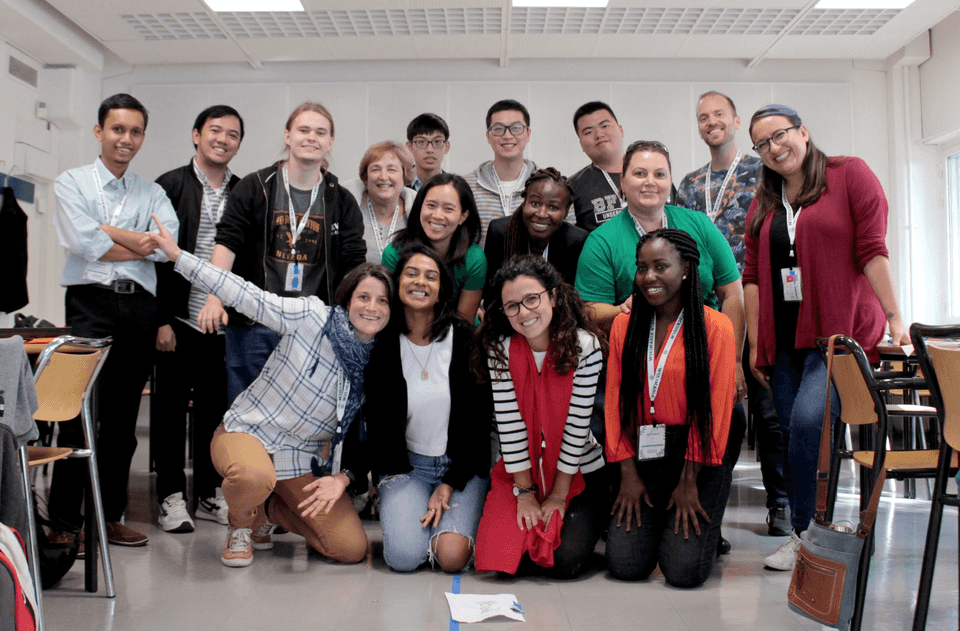Wikimania 2019 Learning Days
I was accepted to participate in the Learning Days for two full days at Wikimania 2019 with Cohort 1. This year, the Wikimedia Foundation Community Development team organized three different cohorts to provide better learning experience based on different levels of involvement with Wikimedia projects. My cohort was designed for early organizers who wanted to build skills to make movement growth or organize an event on the community level. My cohort was about 20 wikimedians from all over the world (from Sweden, China, South Africa, Ghana, Denmark, Thailand, Hong Kong, Philippine, Indonesia, Macedonia, France, Uruguay, Peru, US, and Canada) and my facilitators were an amazing team of Simona Ramkisson (Manager of Community Development), Melissa Guadalupe Huertas (Education Program Officer), and Woubzena Jifar (Rapid Grants Program Officer).
My teammates (photo by DRanville_WMF, CC-BY-SA 4.0)

I thought that the Learning Days was about educating people like me how to edit Wikipedia, introduce other Wikimedia projects, or etc. The facilitators, however, clearly indicated on the first day that goals and objectives of the Learning Days were “to build foundational knowledge and skills necessary for planning impactful Wikimedia events that would support growth.” Without knowing ourself, we couldn’t grow or make the movement grow either and that’s why we spent a half day to identify who we were, why we were here, what we wanted to accomplish, and where to improve ourself to make that happen. The stories that my cohort team members shared were engaging and compelling, but since one of our safe space agreements was not to share what we discussed or other members’ stories without their permission in the Learning Days, so I will just share mine in this blog.
Although I have used Wikimedia projects for a long time, I didn’t quite know how to participate and contribute until I met Mairelys Lemus-Rojas (Digital Initiatives Metadata Librarian at IUPUI) who taught and shared her expertise and knowledge of Wikimedia including Wikipedia and Wikidata with me. As a first and small step, I started using a tool, OAbot, to add open access publications in the citations or update articles like National Aboriginal Health Organization to provide its official website link to wayback machine. I also attended the Women in STEM Wikipedia Edit-A-Thon organized by Ingenium (formerly known as the Canada Science and Technology Museum Corporation) as I wanted to contribute to enhancement of women’s visibility in Wikimedia projects.
I thought that the Canadian Archive of Women in STEM collection could be a good example to improvement of the representation of Canadian women in STEM in Wikimedia projects and possibly developing a new application for display and discovery like Science Stories. I was fascinated by the work done by Mairelys Lemus-Rojas and Jere Odell (Scholarly Communications Librarian at IUPUI) to contribute data about IUPUI’s faculty profiles and their scholarly outputs and use a thirty-party tool like Scholia to create faculty profiles and bibliographic visualizations from Wikidata [1]. In addition, after attending a workshop on Wikidata led by Constance Crompton (assistant professor and Canada Research Chair in Digital Humanities in the Department of Communication at uOttawa), this could be a fun pilot project to explore more Wikidata in depth.
My post-it notes for goals and objectives

I had ideas, but I didn’t know how to execute them in a sustainable way other than creating myself few entries when times allowed. The first activity - know yourself - was really helpful for me to assess my S.W.O.B (strengths, weaknesses/challenges, opportunities, barriers). I was able to identify my weaknesses (or challenges) which led me to think about some of the actions that I could take to accelerate my development in 3, 6, 12 months. This also allowed me to see opportunities that I have wonderful colleagues around me who are interested in open knowledge or Canadian women in STEM so I could collaborate with them to move forward. I felt that the workshop was one of the best workshops I’ve ever attended. I didn’t know “why” at that moment, but on reflection, everyone was honestly themselves to share their personal stories, even Simona, Melissa, and Woubzena.
On the second day, we spent a chunk of time to focus on how to create an action plan with partnership and human-centred design in mind. I believed that in order to go into partnership, there should be a perfect plan or idea to convince other parties to work together. However, I learned from the workshop that starting with an informal relationship (even just chat with lunch or coffee) can turn into a big opportunity to collaboration. Even though I started my librarian career as digital user experience librarian, I easily forget that the UX concepts (i.e., human-centred design or design thinking) can be applied to anywhere beyond digital environments. Simona shared her journey from inspiration, ideation to implementation and highlighted that this process is very iterative and in every process, we should put “people” in the centre and think in terms of their perspectives, especially when something doesn’t work out as planned.
After I was back from the Wikimania 2019 conference, my first action was to ask for collaboration and share what I learned with my colleagues. In terms of organizing a datathon event, I don’t think that this could be held in anytime soon, but now I know where to ask for help, how to design, and mostly my amazing collaborators. I really feel grateful that I was able to participate in the Learning Days and thank you to all, Simona, Melissa, Woubzena and my Cohort 1 team members who made my learning experience very fun and enjoyable.
References
[1] Creating Structured Linked Data to Generate Scholarly Profiles: A Pilot Project using Wikidata and Scholia. Mairelys Lemus-Rojas and Jere Odell. DOI: 10.7710/2162-3309.2272